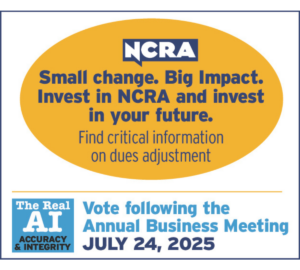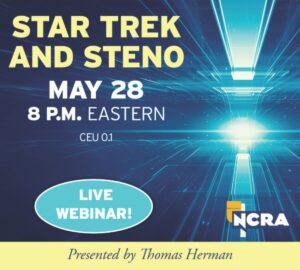
By Angie Starbuck
Stenographers are often referred to as “the person with that little machine.” While the technology behind “that little machine” is state-of-the-art and is continually improved upon, it’s really the human aspect of stenography that makes it the best method for capturing the spoken word and preserving the record of some of the most important cases in history.
In the past year alone, stenographers have played an important technological role with a seat at the Oscars, presidential impeachment hearings, Coachella Music Festival, presidential debates, and just about any other important venue where words are spoken that need to be preserved or instantly viewed to provide access.
Even with the modern advances of voice recognition software and automatic speech recognition, the stenographic court reporter is still the highest standard for protecting your record in litigation. Some would even argue that the stenographic court reporter is the only person permitted by law to certify deposition transcripts in some states.
Almost half of the states in our country require some sort of certification for stenographic court reporters in order for them to work in that state. Some states have their own licensing boards that regulate the court reporters’ activities. Stenographic court reporters are trained, highly skilled professionals who are impartial guardians of the record. They are there to protect your record and preserve testimony in cases that are extremely important to the parties involved.
There is an unsettling practice occurring in the deposition industry, particularly in California and Texas. There are large court reporting corporations that will accept your deposition scheduling and will, without your knowledge or permission, send a digital recorder or videographer to record the testimony rather than a stenographic court reporter. These digital audio files are then uploaded to servers for unknown laypeople to transcribe the testimony.
This practice is concerning on many levels. Let’s start with the most important issue: Your client’s right to confidentiality. With digital audio files being uploaded to unknown companies, servers, and transcribers, sometimes in other countries, there’s no guarantee of privacy or confidentiality for your client. Data mining is a major source of hacking today. Imagine the amount of information that could be mined from confidential deposition transcripts of patent cases, pharmaceutical development cases, or governmental cases, to name a few.
Digital files are also easily manipulated. Perhaps you’ve heard of the artificial intelligence company of podcaster and comedian Joe Rogan.1 The company itself states: “Clearly, the societal implications for technologies like speech synthesis are massive. And the implications will affect everyone. Poor consumers and rich consumers. Enterprises and governments.”2
These manipulated audio files (and video files) are also known as “deepfakes,” which are produced by sophisticated artificial intelligence programs.
The American Bar Association held a panel discussion on this very subject in February at the ABA Techshow 2020, addressing how the “new deepfake culture can impact our relationship to information and the tools we use to work with it.”3
Panelist Sharon Nelson, president of Sensei Enterprises, Inc., a digital forensics, cybersecurity, and information technology firm, said in an interview that deepfakes pose challenges for the legal community, and it’s going to take some time to educate judges and the legal profession. “I believe in civics, and I believe in the rule of law,” Nelson said during the panel. “And deepfakes, if nothing else, do threaten the rule of law, because people no longer know what the truth is.”4
With some legal cases valued in the millions of dollars, imagine if a digital audio file from a deposition got into the wrong hands and the audio file was manipulated in order to improve one’s legal position in a case. Imagine an audio or video file being manipulated in a custody case or a divorce case to bolster one’s position. Imagine a criminal in another country being given an audio file from a deposition to gain access to government intelligence, corporate trade secrets, or intellectual property.
In January 2020, the Federal Trade Commission held a workshop in Washington, D.C., about voice cloning technologies.5 Their stated goal for the four-hour workshop was “to learn about this technology, its implications, and what can be done to confront the danger it poses.” FTC Commissioner Rohit Chopra stated in his opening remarks: “We all know the benefits of new technologies and the immense fortunes that they can shower on us and the companies that create them. But many of us are concerned about how these technologies are misused and abused. Today technology and data are weaponized by those who wish to do our country and our society harm.”
You can’t help but wonder, if the FTC and a digital forensics legal expert are looking at the dangers of artificial intelligence, automated speech recognition, and voice cloning, isn’t this something we, as officers of the court, should be concerned about in the discovery phase of litigation?
When a stenographic court reporter takes a deposition or court proceeding, their stenographic notes are the underlying proof of accuracy of that transcript. These stenographic notes cannot be altered or changed. The stenographic court reporter can also provide a realtime feed to counsel during the proceedings so they can instantly see the accuracy of the record.
Once you take the unbiased human element out of court reporting, you could be opening up your law firm, yourself, and most importantly, your client, to disastrous consequences down the road.
So what is the solution, and how can you ensure the testimony taken in your case is held to the highest standards that your client deserves?
■ Make sure your deposition notice states that the deposition will be taken before a stenographic court reporter.
■ When scheduling the deposition with your court reporting firm, be sure to specify that you only want a stenographic court reporter to cover the deposition. Be sure to double-check that you will have a stenographic court reporter when they confirm the setting closer to the deposition date.
■ If you’re traveling to another state or city for a deposition, check with a court reporter or firm that you really trust to see if they can recommend a stenographic court reporter or firm in the location of your deposition.
■ Be sure you are familiar with the rules in the venue your case is pending. There could be rules regarding objections to the officer before whom the deposition is taken. There could be rules regarding the validity or admissibility of transcripts that are not taken or certified by a Certified Shorthand Reporter in that state.
According to the National Court Reporters Association Code of Professional Ethics, the stenographic court reporter has a duty to “preserve the confidentiality and ensure the security of information, oral or written, entrusted to the Member by any of the parties in a proceeding.” Your court reporter or court reporting firm should be as concerned about the importance of maintaining the confidentiality of your case as you are.
Don’t be afraid to ask questions of the court reporters or firms you are using across the country. Make sure you have as much information as they do about the services provided. And remember, there’s currently no technology available that can outperform a well-trained stenographer.
Angie Starbuck, RDR, CRR, CRC, is a captioner, freelancer, and firm owner based in Columbus, Ohio. She can be reached at angie@priohio.com.
This article is taken from the Columbus Bar Lawyers Quarterly Summer 2020 issue and reprinted with permission of the Columbus Bar Association.
1 https://youtu.be/DWK_iYBl8cA
2 Dessa. (2019, May 15). medium.com. Retrieved from https://medium.com/dessanews/real-talk-speech-synthesis-5dd0897eef7f
3 Techshow, A. (2020). Retrieved from Techshow 2020: https://www.techshow.com/sessions/red-pill-vs-blue-pill-how-deep-fakes-are-defining- digital-reality
4 Reynolds, M. (2020, February 28). Retrieved from ABA Journal: https://www.abajournal.com/news/article/aba-techshow-experts-warn-of-deepfake-threats-to-justice-system
5 Federal Trade Commission. (2020, January 28). Federal Trade Commission. Retrieved from https://www.ftc.gov/news-events/events-calendar/you-dont-say-ftc-workshop-voice-cloning-technologies







[…] about our angst. Over time, brilliant articles from people like Eric Allen, Ana Fatima Costa, Angie Starbuck (bar version), and Stanley Sakai start to get buried or appear dated when, in actuality, not much […]